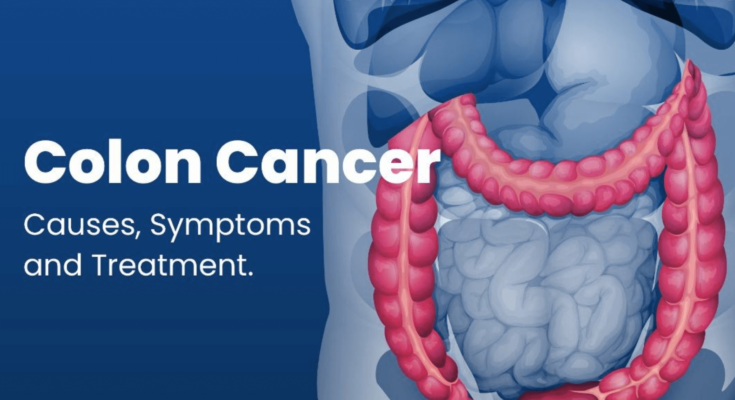Colon Cancer Symptoms: Colon cancer, a formidable health challenge affecting millions globally, demands our undivided attention.
Understanding its symptoms and causes is paramount in fostering early detection and effective treatment strategies.
What is Colon Cancer?
Colon cancer, also known as colorectal cancer, is a type of cancer that occurs in the colon or rectum, parts of the large intestine. This disease is characterized by the uncontrolled growth of cells in the inner lining of the colon. Understanding colon cancer is crucial as it is one of the most common types of cancer worldwide.
Brief Statistics and Demographics Affected
Colon cancer is a significant health concern globally. Here are some key statistics:
- It is the third most commonly diagnosed cancer in both men and women.
- The American Cancer Society estimates that in the United States alone, there will be over 100,000 new cases of colon cancer each year.
- Colon cancer primarily affects older adults, with a majority of patients being diagnosed over the age of 50. However, there has been a rise in cases among younger people in recent years.
- The risk factors include a family history of colon cancer, a diet high in red and processed meats, obesity, smoking, and heavy alcohol use.
- Early detection through screening like colonoscopies significantly improves survival rates.
The Role of the Colon in the Human Body
The colon, or large intestine, plays a vital role in the human digestive system. Its main functions are:
- Water Absorption: The colon absorbs water and salt from the remaining food matter after it goes through the small intestine, thus transforming it from a liquid into a solid form.
- Waste Storage and Elimination: It stores waste – the byproduct of digestion – and coordinates its elimination from the body.
- Nutrient Absorption and Bacterial Growth: The colon also absorbs some nutrients and electrolytes. It fosters a healthy bacterial environment, which aids in digestion and supports the immune system.
Understanding the function of the colon helps in appreciating how colon cancer can disrupt these vital processes, emphasizing the importance of early detection and treatment.
Early Signs and Symptoms of Colon Cancer
Detecting colon cancer in its early stages can significantly improve treatment outcomes. Understanding the early signs and symptoms of this disease is crucial for prompt diagnosis and intervention. This article delves into the early indicators of colon cancer, providing a detailed exploration of these symptoms and how they differentiate from regular digestive issues.
Detailed Exploration of Early Symptoms
- Changes in Bowel Habits: Persistent alterations in bowel movements, such as diarrhea, constipation, or a change in stool consistency, lasting more than a few days, can be an early sign of colon cancer.
- Rectal Bleeding or Blood in Stool: One of the most noticeable signs is the presence of bright red or very dark blood in the stool, which should always prompt a consultation with a healthcare professional.
- Persistent Abdominal Discomfort: Cramps, gas, or pain that seems unusual or persistent may indicate the presence of colon cancer.
- Feeling of Incompleteness: A sensation that the bowel doesn’t empty completely after a bowel movement can be an early symptom of colon cancer.
- Unexplained Weight Loss: Losing weight without changes in diet or exercise habits can be a sign of various conditions, including colon cancer.
- Weakness or Fatigue: Unexplained weakness or fatigue can be a symptom of colon cancer, often due to the cancer’s effect on the body’s ability to produce and use energy.
- Iron Deficiency Anemia: If tests show unexplained anemia (a lack of healthy red blood cells), it may be due to colon cancer causing bleeding in the digestive tract, which depletes the body’s iron.
Differentiation from Normal Digestive Issues
While some symptoms of colon cancer might resemble common digestive problems, there are key differences to be aware of:
- Duration and Consistency: Symptoms of colon cancer are persistent and do not resolve with standard remedies for common digestive issues.
- Severity and Progression: The symptoms tend to worsen over time and might be accompanied by a progressive decline in overall health.
- Blood in Stool: While hemorrhoids can also cause blood in the stool, blood associated with colon cancer is typically more persistent and not solely related to bowel movements.
- Weight Loss: Unlike common digestive issues that might cause temporary weight fluctuations, colon cancer can lead to significant and unexplained weight loss.
However, recognizing the early signs and symptoms of colon cancer is vital for early detection and treatment. If you experience any of these symptoms persistently, it is essential to consult a healthcare professional for a thorough evaluation. Early intervention is key to managing and potentially overcoming colon cancer.
Advanced Symptoms of Colon Cancer
As colon cancer progresses to more advanced stages, the symptoms become significantly more severe and cannot be overlooked. Recognizing and addressing these symptoms promptly is crucial for effective treatment and management.
What are the Advanced Symptoms?
- Intense Abdominal Pain and Discomfort: Unlike the mild discomfort experienced in the early stages, advanced colon cancer often leads to severe abdominal pain. This pain is persistent and can significantly disrupt daily activities.
- Unexplained Weight Loss: Rapid weight loss without any changes in diet or exercise routine is a hallmark of many cancers, including advanced colon cancer. This symptom is often accompanied by a loss of appetite.
- Changes in Bowel Habits: Patients may experience chronic diarrhea or constipation. These changes are more pronounced and persistent than those in the early stages.
- Blood in Stool or Rectal Bleeding: While this can occur in earlier stages, the bleeding tends to be more frequent and noticeable in advanced colon cancer.
- Jaundice: This is characterized by yellowing of the skin and eyes, indicating that the cancer may have spread to the liver.
- Fatigue and Weakness: Persistent tiredness, which does not improve with rest, is a common symptom in advanced stages.
- Shortness of Breath or Chest Pain: These symptoms may occur if the cancer has spread to the lungs.
The Critical Importance of Not Ignoring Symptoms
Ignoring these symptoms can lead to a rapid progression of the disease. Early detection and treatment are key to improving survival rates and quality of life. Advanced symptoms often indicate that the cancer has spread beyond the colon, making treatment more challenging.
Symptom Severity and Cancer Progression
There is a direct correlation between the severity of symptoms and the progression of colon cancer. As the cancer grows and spreads to other organs, symptoms become more intense and debilitating. This progression underscores the urgency for individuals to seek medical attention as soon as they notice any severe or persistent symptoms.
However, understanding and being vigilant about the advanced symptoms of colon cancer can be life-saving. It’s essential to consult healthcare professionals immediately if any of these symptoms are present. Early intervention remains the most effective strategy against the progression of colon cancer.
Causes and Risk Factors for Colon Cancer
Understanding the causes and risk factors for colon cancer is crucial for early detection and prevention. This article provides an insightful look into the common causes, risk factors, and the roles of lifestyle, genetics, and other predispositions in the development of colon cancer. By comprehending how these factors contribute to the onset of colon cancer symptoms, individuals can take proactive steps towards their health.
Common Causes
- Dietary Factors: A diet high in red and processed meats has been linked to an increased risk of colon cancer. Conversely, diets rich in fruits, vegetables, and whole grains may offer protective benefits.
- Physical Inactivity: Lack of regular physical activity is another significant contributor. Sedentary lifestyles can increase the risk of colon cancer.
- Obesity: Being overweight or obese is a known risk factor. Excess body weight is associated with a higher risk of developing and dying from colon cancer.
- Smoking and Alcohol Consumption: Long-term smoking and heavy alcohol use are proven risk factors for colon and other types of cancers.
- Age: The risk of colon cancer increases with age, particularly after the age of 50.
Risk Factors
- Family History and Genetics: A family history of colon cancer or polyps can significantly increase one’s risk. Genetic syndromes like Lynch syndrome and familial adenomatous polyposis (FAP) also elevate the risk.
- Personal Health History: Individuals with a history of inflammatory bowel diseases, such as Crohn’s disease or ulcerative colitis, have a higher risk of colon cancer.
- Racial and Ethnic Background: Certain ethnicities, such as African Americans and Ashkenazi Jews, have a higher prevalence of colon cancer.
- Type 2 Diabetes: Those with type 2 diabetes may have an increased risk of colon cancer.
Discussion on Lifestyle, Genetic Factors, and Other Predispositions
Lifestyle choices play a significant role in the risk of developing colon cancer. Diets high in processed foods and low in fiber, sedentary lifestyles, smoking, and heavy alcohol use are key modifiable risk factors. Addressing these can significantly reduce one’s risk.
Genetic factors also contribute substantially. Individuals with a family history of colon cancer or inherited syndromes are at a heightened risk. This emphasizes the importance of regular screenings, especially for those with genetic predispositions.
Other predispositions include factors such as age, racial and ethnic background, and pre-existing medical conditions like inflammatory bowel disease or type 2 diabetes. These factors are not modifiable but knowing about them can help in early detection and management.
How These Factors Contribute to the Onset of Colon Cancer Symptoms
The interaction of lifestyle, genetic, and other predispositions can lead to the development of polyps in the colon, which may turn cancerous over time. Symptoms often do not appear until the cancer is more advanced, making awareness and regular screenings crucial. A healthy lifestyle, awareness of personal and family medical history, and regular screenings can significantly impact the prevention and early detection of colon cancer.
Understanding these factors offers a pathway to better health choices and highlights the importance of regular medical check-ups and screenings. By acknowledging the causes and risk factors, individuals can take meaningful steps towards reducing their risk of colon cancer.
Importance of Screening and Early Detection in Colon Cancer
Colon cancer screening is an essential health measure that can significantly impact outcomes. The primary purpose of screening is to detect colon cancer at an early stage before symptoms develop. Common screening methods include:
- Colonoscopy: This is the most comprehensive screening test, allowing doctors to view the entire colon and remove polyps if necessary.
- Stool tests: These are non-invasive tests that check for blood or abnormal DNA in the stool, which can be signs of cancer.
- Flexible sigmoidoscopy: Similar to a colonoscopy, this test examines the lower part of the colon.
- CT colonography (virtual colonoscopy): This imaging test provides detailed pictures of the colon and rectum.
Regular screening is advised starting at age 45 for most adults, but earlier or more frequent screening may be recommended for those with a higher risk, such as a family history of colon cancer.
The Role of Screening in Early Symptom Identification
Early detection through screening plays a crucial role in colon cancer management. In the initial stages, colon cancer often exhibits no symptoms. When symptoms do appear, they might include changes in bowel habits, blood in the stool, abdominal discomfort, or unexplained weight loss. Screening can identify these early signs, leading to a prompt diagnosis.
Impact of Early Detection on Survival Rates
Statistics underscore the importance of early detection in improving survival rates. When colon cancer is caught at an early, localized stage, the five-year survival rate is about 90%. However, if the diagnosis occurs after the cancer has spread to distant parts of the body, the survival rate drops significantly. Regular screening can increase the likelihood of detecting cancer early, improving the chances of successful treatment and survival.
However, regular screening for colon cancer is a vital health measure. It not only helps in the early detection of the disease but also significantly improves the chances of successful treatment and increases survival rates. Individuals should consult with their healthcare provider to determine the most appropriate screening schedule based on their risk factors. Remember, early detection saves lives.
Misconceptions About Colon Cancer Symptoms
It’s crucial to debunk these myths for better awareness and early detection, which can significantly improve treatment outcomes. In this section, we’ll address common myths and clarify which symptoms are directly related to colon cancer and which are not.
1. Myth: Only Severe Pain Indicates Colon Cancer
Reality: Colon cancer often begins without pain. Symptoms like changes in bowel habits, blood in stool, or unexplained weight loss are more indicative. Severe pain usually occurs in advanced stages, so waiting for pain before seeking medical advice can be dangerously misleading.
2. Myth: Blood in Stool Always Means Colon Cancer
Reality: While blood in the stool can be a sign of colon cancer, it’s also common in less serious conditions like hemorrhoids or minor fissures. However, any occurrence of blood in the stool should prompt a medical evaluation to rule out or confirm colon cancer.
3. Myth: Age Doesn’t Matter in Colon Cancer Development
Reality: Age is a significant risk factor. The likelihood of developing colon cancer increases substantially after the age of 50. Younger adults can develop it too, but it’s less common. Screening is recommended for adults beginning at 45-50 years old.
4. Myth: If You Feel Healthy, You Don’t Have Colon Cancer
Reality: Many individuals with early-stage colon cancer feel perfectly healthy. This is why regular screening is vital. Early detection can often lead to a complete cure, and screening tests can detect colon cancer before symptoms even appear.
5. Myth: All Gastrointestinal Issues are Signs of Colon Cancer
Reality: Symptoms like gas, bloating, and intermittent abdominal discomfort are common and usually not related to colon cancer. These symptoms are often caused by diet, lifestyle factors, or other benign gastrointestinal issues.
6. Myth: A Family History of Colon Cancer Means You Will Get It
Reality: A family history of colon cancer increases the risk but does not guarantee you will develop it. It’s important to inform your doctor about your family history, as this may influence the recommended age and frequency of screening.
Understanding what colon cancer symptoms look like and dispelling myths surrounding them is critical for early detection and successful treatment. Remember, symptoms can vary, and not all gastrointestinal issues are indicative of colon cancer. Regular screening and consultation with healthcare professionals are key to maintaining colon health. If you experience any concerning symptoms, don’t hesitate to seek medical advice. Remember, early detection can save lives.
When to See a Doctor
Recognizing when to consult a healthcare professional is crucial. This guide outlines key guidelines for seeking medical advice and emphasizes the importance of regular check-ups, especially for individuals in high-risk groups.
Recognizing Symptoms: When to Seek Immediate Advice
Certain symptoms should prompt an immediate visit to your doctor, including:
- Persistent Changes in Bowel Habits: This includes changes in consistency, frequency, or the appearance of blood in your stool.
- Unexplained Weight Loss: Losing weight without changes in diet or exercise routines can be a warning sign.
- Chronic Abdominal Discomfort: Persistent pain, cramps, gas, or feeling full or bloated can indicate underlying issues.
- Weakness or Fatigue: Unexplained tiredness can be a symptom of colon cancer due to blood loss.
High-Risk Individuals: The Need for Regular Screenings
For those at higher risk, regular screenings are non-negotiable. Risk factors include:
- Age: Individuals over 50 are at increased risk, though rates in younger adults are rising.
- Family History: A history of colon cancer or polyps in the family can increase your risk.
- Lifestyle Factors: Diet, exercise, smoking, and alcohol consumption can influence risk.
- Previous Diagnosis: Those who have had colon cancer or certain types of polyps are at a heightened risk of a recurrence.
Importance of Regular Check-Ups
Regular check-ups allow for the early detection of polyps, which can be removed before they turn into cancer. Healthcare professionals can recommend a screening schedule based on your risk factors. Common screening tests include colonoscopies, stool tests, and flexible sigmoidoscopy.
Don’t wait for symptoms to worsen. If you’re experiencing any signs of colon cancer or fall into a high-risk category, schedule an appointment with your doctor. Early detection is key to effective treatment and can save lives. Remember, regular check-ups and screenings are your best defense against colon cancer. Prioritize your health and consult with healthcare providers to determine the most appropriate screening schedule for you.
Prevention and Lifestyle Changes: Key Strategies for Reducing Colon Cancer Risk
Colon cancer, a significant health concern worldwide, can often be prevented through a combination of awareness, regular screenings, and lifestyle modifications. This article focuses on practical tips and advice aimed at reducing the risk of developing colon cancer and alleviating the severity of its symptoms.
Lifestyle Modifications to Lower Risk
- Healthy Diet: A balanced diet rich in fruits, vegetables, and whole grains is crucial. These foods are high in fiber, which aids in maintaining a healthy colon. Limiting red meat and avoiding processed meats can also reduce colon cancer risk.
- Regular Exercise: Physical activity plays a vital role in overall health and can significantly lower the risk of colon cancer. Aim for at least 30 minutes of moderate exercise most days of the week.
- Maintaining a Healthy Weight: Being overweight or obese increases the risk of colon cancer. Working towards a healthy weight through diet and exercise is beneficial.
- Avoiding Tobacco and Limiting Alcohol: Smoking is a known risk factor for colon cancer. Quitting smoking and limiting alcohol consumption can greatly reduce your risk.
Preventative Screenings
- Regular Screenings: Early detection through screenings like colonoscopies can save lives. Starting at age 45 or earlier based on family history or other risk factors, regular screenings are recommended.
- Know Your Family History: Genetics play a role in colon cancer. Knowing your family history can help you and your healthcare provider make informed decisions about early and more frequent screenings.
Implementing these lifestyle changes and staying informed about colon cancer can significantly reduce your risk. Regular screenings, a healthy diet, exercise, and avoiding harmful habits are key strategies in the fight against colon cancer. Remember, the choices you make every day can have a lasting impact on your health.
Conclusion:
The importance of early detection cannot be overstated. Understanding the symptoms of colon cancer is the first step towards timely diagnosis and treatment. Early-stage colon cancer often has a higher survival rate, emphasizing the need for awareness and prompt action.
In conclusion, empowering yourself with knowledge about colon cancer symptoms and causes, and taking proactive steps towards screening and healthy lifestyle choices, can significantly impact your overall health and well-being. Remember, being informed is your first line of defense against this disease. Take charge of your health today by staying vigilant and consulting healthcare professionals whenever necessary. Your proactive measures could make all the difference.



